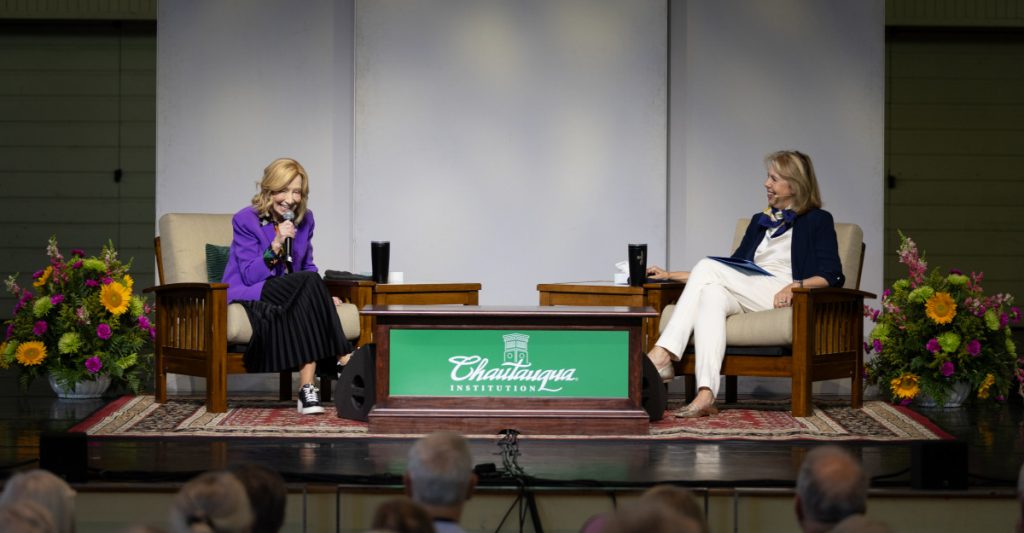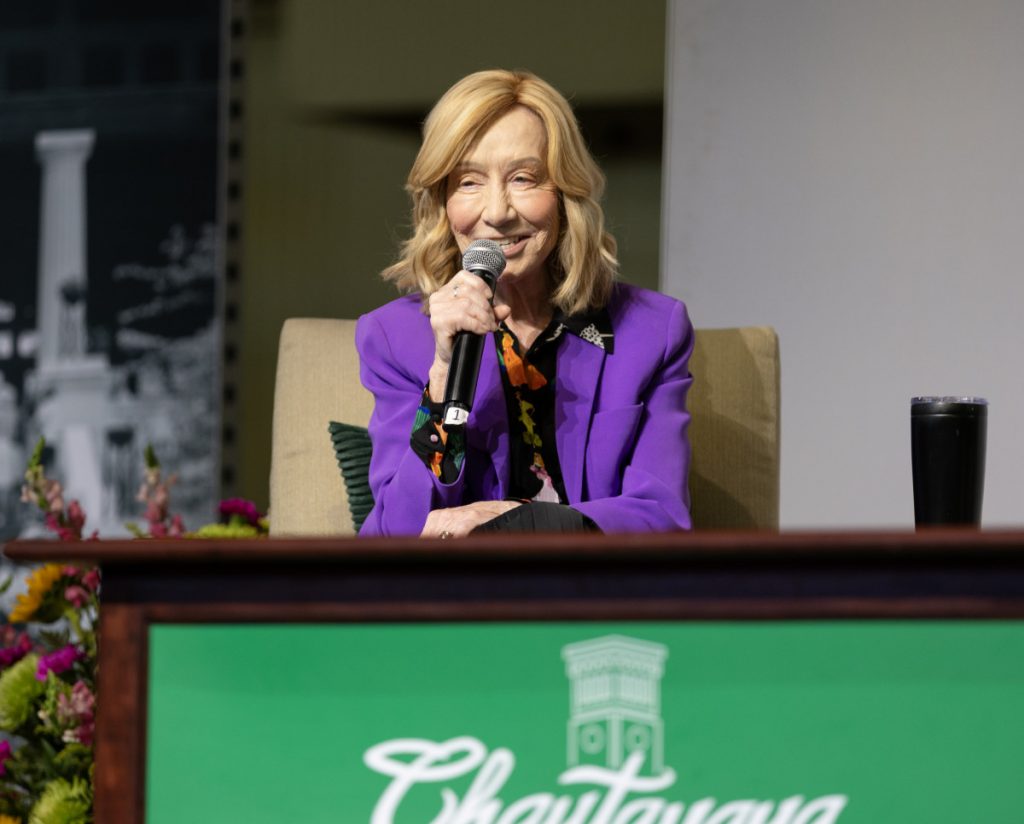

Susie Anderson
Staff Writer
While “unprecedented” is often used to describe America’s current challenges, Doris Kearns Goodwin reminded Chautauquans that history has seen turbulent times before — and it can offer guidance for the present.
“History can help us at this moment because we feel like it is a time unlike any others and a time of great anxiety,” Goodwin said. “But we have lived through really, really great anxiety before.”
The Pulitzer Prize-winning presidential scholar opened Week Nine’s Chautauqua Lecture Series’ theme “Past Informs Present: How to Harness History” at 10:45 a.m. Monday in the Amphitheater in conversation with Nancy Gibbs, former managing editor of Time Magazine and Chautauqua Institution trustee.
Goodwin is a world-renowned presidential historian, public speaker and author who recently published An Unfinished Love Story: A Personal History of the 1960s. With five decades of scholarship studying presidents Abraham Lincoln, Theodore Roosevelt, Franklin Delano Roosevelt and Lyndon Johnson, Goodwin returned to the Amp stage for the first time since 1997. In the lecture, she discussed the qualities, challenges and triumphs of the presidents she has studied and how they can inform modern leadership and the future of America.
Grounding the Chautauqua audience in a history of tumult, Goodwin highlighted Lincoln at the eve of the Civil War, Theodore Roosevelt at the turn of the 20th century and Franklin Roosevelt at the time of his inauguration.
“We have to believe history is telling us, giving us perspective, lessons and hope,” Goodwin said. “We can do it again.”
Gibbs asked Goodwin about her connection to the presidents she has studied over the course of her career, which she fondly refers to as “my guys.”
“I have lived with them so long — I lived with them longer than anyone, except my husband,” Goodwin said. “It took me 10 years to write about Lincoln, longer than writing about World War II than the war to be fought. They became my guys.”
Goodwin credited her work as a White House Fellow for President Lyndon Johnson as the origin for her interest in presidents, although she worried her position was at risk after an article she wrote against him was published.
“I was certain he would kick me out of the program,” she said. “Surprisingly, he said, ‘Bring her for a year, and if I can’t win her over, no one can.’ ”
The experience informed Goodwin’s first biography on Johnson, as he talked with her often and at length, from the pool to picnics.
“I would like to believe it was because I was a good listener,” Goodwin said. “He was a great storyteller. Colorful stories. But there was a problem. I later discovered many weren’t true. But they were great, nonetheless.”
Goodwin told Gibbs there is no magical key to great leadership, but there are similar qualities across the presidents she has studied.
“Think about today’s leadership when you hear me say these: humility, empathy, resilience, accessibility, kindness, compassion and ambition for something larger than one’s self,” Goodwin said. “Those are the qualities that matter depending on the time.”
In the case of Lincoln, Goodwin said she felt as though she became a better person after studying him. Instead of disparaging his enemies, he put three of his chief rivals in his cabinet.
“His friends said, ‘How can you do this? You will look like a figurehead with all of these people around you.’ He said, ‘The country is in peril. These are the best in the country. I need them by my side,’ ” Goodwin said.
Johnson would put it another way, Goodwin said.
“He liked to say, ‘Better to have your enemies inside the tent pissing out than outside the tent pissing in,’ ” she said.
Goodwin highlighted Lincoln’s empathy in moving forward rather than persecuting Confederate leaders after the Civil War. In the case of Theodore Roosevelt, his trajectory to leadership emerged through tragedy.
“His mother contracted typhoid fever, and he got home in time, and she died,” Goodwin said. “Twelve hours later, his wife died from childbirth. He said, ‘The light has gone out of my life.’ ”
Following the loss of his loved ones, Roosevelt spent two years in the Badlands of California, inspiring his conservation efforts. Instead of focusing on a linear career, he worked in service and learned to bring economic classes together.
“He was a Westerner, a cowboy and an Eastern dude who had lived in the South, in the North, gone across classes, privilege and nonprivilege and was able to bring the country together with, as I said earlier, that simple slogan — a square deal for the rich and poor, the capitalist and the laborers,” Goodwin said.
While Theodore Roosevelt bridged classes, Franklin Roosevelt was strengthened by the adversity of his polio disease and, in a presidency marked by resiliency, took the responsibility off Americans during the Great Depression.
“He said, ‘This isn’t your fault. It’s a failure of leadership, and I’m here to provide that leadership. I will go to Congress with an emergency session, I will get you jobs, I will take care of your banking system. … We will get through this,’ ” Goodwin said.
While the power of optimism carried Roosevelt through that time period, drawing the United States out of isolationism in World War II, he had to reinvigorate American production. Offering corporations funds to transform their businesses into productions of military armaments, Roosevelt gave America the boost it needed to succeed. By 1942, military production had skyrocketed.
“We were building an airplane every four minutes, a tank every seven minutes and a ship in 1942 was launched every single day,” Goodwin said. “And then our weapons were used by our system for all our allies, and the allies were able to, with the bravery of U.S. soldiers and alliances, win the war to save Western civilization.”
Goodwin discussed Johnson’s priority of passing the Civil Rights Bill immediately after taking office, gathering congressmen for dinner and making promises in exchange for their support, even appealing to the ego of Senate Minority Leader Everett Dirksen.
“(Johnson) said, ‘You know, Everett, If you come with me on the bill and bring the Republicans along, 200 years from now, school children will know two names, Abraham Lincoln and Everett Dirksen,’ ” said Goodwin.
Turning to her recent book, An Unfinished Love Story: A Personal History of the 1960s, Goodwin described the day that her late husband, presidential aide and speechwriter Richard Goodwin, decided to look into 300 boxes of documents collected throughout his career, including speech drafts, interviews and VHS tapes.
Richard Goodwin was recommended to Johnson by presidential aide and reporter Bill Moyers, after Johnson said he wanted “someone who can put rhythm into my speeches, someone who can put sex into my speeches, someone who can put great Churchillian phrases into my speeches.”
Goodwin shared her favorite story in which Moyers told Richard Goodwin that the president wanted to discuss the Johnson program — in the pool. Since Johnson enjoyed swimming in the nude, he invited Goodwin and Moyers to join while he outlined his plans.
“Johnson starts telling them everything he wants to do. Medicare, aid to education, Head Start, immigration reform, NPR, PBS,” Goodwin said. “Everything was in his head.”
From the conversation, Richard Goodwin wrote up Johnson’s speech later delivered at the University of Michigan, which remains a landmark speech that defined America’s “Great Society.”
“The Great Society was born in a pool with three naked guys swimming around,” Goodwin said.
After watching Johnson deliver his speech on Selma, Goodwin stepped outside to smoke and heard kids singing “We Shall Overcome” in the distance.
“He came in and wrote the phrase that became the title of the speech,” Goodwin said. “Even if we get the right to vote, there’s 100 years of discrimination to overcome. If we work at it together, not as Republicans, not as Democrats, we shall overcome.”
The moment brought the audience to tears, including Martin Luther King Jr.
“Dick, at the back of the room, said he never could have guessed that two years after that, when he loved Johnson so much that night, that he would be marching against him in the streets,” Goodwin said.
For Goodwin, the transition reflected the core tenet of democracy.
“(Democracy) is allowing people to decide who their leader should be and allowing people to throw those leaders out,” Goodwin said. “That’s what we have to get back to.”
In a time when information comes from a variety of sources, Gibbs asked Goodwin if she had ever wondered what a tweet from Lincoln might look like.
“I’m not sure that he would do a tweet,” Goodwin said, “because he understood that extemporaneous remarks can hurt, as well as heal, and divide, as well as unite.”
In fact, Goodwin shared that Lincoln would encourage people in wartime to sing songs with him rather than make a statement when they arrived on the White House lawns. She highlighted that Theodore Roosevelt captured pithy headlines in a time of national news and Franklin Roosevelt capitalized on his radio voice in his fireside chats, while John F. Kennedy and Ronald Reagan were perfect for television.
“The world of the tweet was mastered by the current president,” Goodwin said. “But the problem with the things like the tweet is they’re not thought through many times. … Somehow we were better off in a time when people could think before they acted — before they spoke — not as many dumb things would be said.”
Goodwin told Gibbs she believes an undervalued quality of leadership is the ability to carve out time to think and relax. The president who was best able to relax, Goodwin said, was Franklin Roosevelt. Every night of World War II, he held a cocktail party for friends and colleagues. As party guests stayed the night, Goodwin said the second floor of the White House became the “most exclusive hotel in the world.”
Goodwin herself had stayed in the same room once used by Winston Churchill, by invitation of Hillary Clinton. The entire night, she imagined Churchill in the corner of her room, which reminded her of when Franklin Roosevelt entered the room to a stark naked Churchill, emerging from the bathtub, at the height of World War II.
“(Churchill), able to speak very formally, said, ‘Oh no, please stay. The Prime Minister of Great Britain has nothing to hide from the President of the United States,’ ” Goodwin said, “… So the next morning, I couldn’t wait to go in the bathtub, and then I was truly in the presence of greatness.”
Of all the presidents she has studied, Goodwin said that Lincoln was the most conscious of his legacy. Following the death of his mother, he felt anxious about making sure his story was told after he died.
“When he signed the Emancipation Proclamation, … he said, ‘Maybe now my fond dream has been realized. Maybe I will be remembered,’ ” Goodwin said. “But not even Lincoln could have ever realized how far his memory would reach.”
Looking to the future, Goodwin reminded audiences that throughout American history, social change emerges from the ground up.
“We have to do what we can to make a difference and make people feel that we are working together,” she said.
She wants to support a national service program to invigorate young Americans with experiences from other parts of the country in sharing a common mission.
“We’ve got to make younger people feel that there is something that can be done, and not (be) cynical about our time and believe in America just as we believe in it as old people,” Goodwin said.




